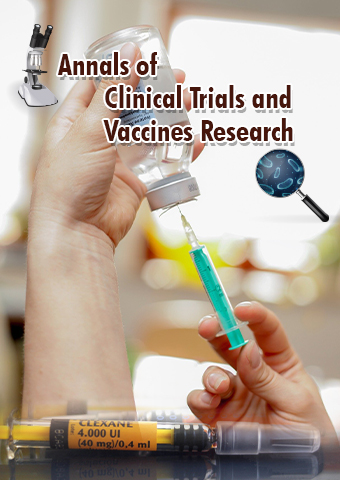Perspective - Annals of Clinical Trials and Vaccines Research (2024) Volume 14, Issue 1
Nourishing the Body and Mind: A Comprehensive Exploration of Nutrition
- Corresponding Author:
- Jan Arvidsen
Department of Social and Preventative Medicine, University of Aarhus, Aarhus, Denmark
E-mail: janarvidsen@health.sdu.dk
Received: 17-Jan-2024, Manuscript No. ACTVR-24-125210; Editor assigned: 19-Jan-2024, PreQC No. ACTVR-24-125210 (PQ); Reviewed: 01-Feb-2024, QC No. ACTVR-24-125210; Revised: 07-Feb-2024, Manuscript No. ACTVR-24-125210 (R); Published: 16-Feb-2024, DOI: 10.37532/ACTVR.2024.14(1).197-199
Introduction
Hypersensitivity, often referred to as an overreaction of the immune system, is a complex and multifaceted phenomenon that manifests in various forms. From common allergic reactions to more intricate autoimmune responses, hypersensitivity involves the immune system responding disproportionately to stimuli, leading to a range of symptoms. In this comprehensive exploration, we will delve into the world of hypersensitivity, unraveling its different types, exploring the underlying causes, and discussing effective strategies for management.
Description
The basics of nutrition
Macronutrients: The building blocks
Macronutrients are the essential components of our diet that provide the energy needed for bodily functions. They are categorized into three main groups:
Carbohydrates: Often referred to as the body’s preferred energy source, carbohydrates are found in foods like grains, fruits, and vegetables. They are broken down into glucose, which fuels our cells.
Proteins: Crucial for the repair and maintenance of tissues, proteins are composed of amino acids. Sources of protein include meat, dairy products, legumes, and nuts.
Fats: Despite their reputation, fats are vital for hormone production, brain function, and the absorption of fat-soluble vitamins. Healthy fats are found in avocados, nuts, seeds, and olive oil.
Micronutrients: The nutrient superheroes
Micronutrients include vitamins and minerals, which are essential for various physiological processes. They act as catalysts for energy production, immune function, and bone health.
Water: The elixir of life: Water is indispensable for life, serving as a medium for biochemical reactions, regulating body temperature, and aiding in nutrient transport. Staying adequately hydrated is critical for overall health.
The impact of nutrition on physical health
Weight management: Nutrition plays a pivotal role in weight management, influencing whether we gain, lose, or maintain our weight. A balanced diet, coupled with regular physical activity, is key to achieving and sustaining a healthy weight.
Energy levels and vitality: Consuming nutrient-dense foods provides a sustainable source of energy, promoting vitality and overall well-being. Balancing macronutrients and incorporating whole foods ensures a steady release of energy throughout the day.
Cardiovascular health: A diet rich in fruits, vegetables, whole grains, and healthy fats contributes to cardiovascular health by regulating blood pressure, cholesterol levels, and reducing the risk of heart disease.
Bone health: Calcium and vitamin D, obtained through dairy products, leafy greens, and exposure to sunlight, are essential for bone health. A well-rounded diet supports bone density and helps prevent conditions like osteoporosis.
Nutrition and mental health
The gut-brain connection: Emerging research highlights the intricate relationship between the gut and the brain. The gut microbiome, influenced by diet, has been linked to mental health, affecting mood, stress levels, and cognitive function.
Nutrients for brain health: Certain nutrients, such as omega-3 fatty acids found in fish, antioxidants from fruits and vegetables, and B vitamins from whole grains, play a role in supporting cognitive function and mental well-being.
Blood sugar regulation: Balancing blood sugar levels through a diet that includes complex carbohydrates, fiber, and protein helps stabilize mood and energy levels. This is particularly important in preventing mood swings and irritability.
The role of hydration: Dehydration can impact cognitive function and mood. Maintaining adequate hydration supports mental clarity, alertness, and overall cognitive performance.
Tailoring nutrition for different life stages
Pregnancy and nutrition: During pregnancy, proper nutrition is crucial for the health of both the mother and the developing fetus. Adequate intake of folic acid, iron, and other essential nutrients supports fetal development and reduces the risk of complications.
Childhood nutrition: Childhood nutrition lays the foundation for growth, development, and lifelong health. Providing a balanced diet rich in nutrients supports physical and cognitive development and helps establish healthy eating habits.
Nutrition in adolescence: The teenage years are characterized by rapid growth and development. Balanced nutrition, along with sufficient calcium and vitamin D, is essential for bone health during this stage.
Nutrition in aging: As individuals age, nutritional needs may change. Adequate protein intake, along with vitamins and minerals, supports muscle mass, bone health, and overall well-being in the elderly.
Practical strategies for a balanced diet
Emphasizing whole foods: Prioritizing whole foods over processed options ensures a diverse array of nutrients. Whole grains, fruits, vegetables, lean proteins, and healthy fats should form the foundation of a balanced diet.
Portion control: Understanding portion sizes helps prevent overeating and promotes weight management. Balancing the intake of macronutrients within appropriate portion sizes is key to achieving a well-rounded diet.
Mindful eating: Practicing mindful eating involves paying attention to hunger and fullness cues, savoring flavors, and appreciating the eating experience. This approach fosters a healthy relationship with food.
Customizing diets: Recognizing that nutritional needs vary among individuals, personalized nutrition approaches consider factors such as age, activity level, health status, and personal preferences. This tailored approach enhances adherence to a healthy diet.
Nutrition and disease prevention
Diabetes prevention and management: A diet rich in whole foods, low in added sugars, and balanced in macronutrients can help prevent and manage diabetes. Fiber-rich foods, such as whole grains and legumes, contribute to stable blood sugar levels.
Cancer prevention: Certain dietary patterns, including a high intake of fruits, vegetables, and antioxidants, are associated with a reduced risk of certain cancers. Additionally, limiting processed meats and alcohol intake contributes to cancer prevention.
Hypertension management: Reducing sodium intake and incorporating potassium-rich foods, such as fruits and vegetables, supports blood pressure management. The DASH (Dietary Approaches to Stop Hypertension) diet exemplifies a nutritional approach beneficial for hypertension.
Inflammatory conditions: An anti-inflammatory diet, characterized by omega-3 fatty acids, antioxidants, and a variety of fruits and vegetables, may help manage conditions associated with chronic inflammation, such as rheumatoid arthritis.
Navigating dietary trends and myths
Superfoods and fad diets: The term “superfood” is often used to describe nutrient-dense foods with potential health benefits. While incorporating these foods is beneficial, it’s essential to maintain a balanced diet and be wary of fad diets that may lack scientific evidence.
The importance of moderation: The principle of moderation emphasizes enjoying a variety of foods in appropriate portions. Avoiding extremes and embracing a balanced approach allows for flexibility in dietary choices.
Debunking nutrition myths: Various nutrition myths persist, ranging from the necessity of detox diets to the demonization of certain food groups. Evidence-based information helps dispel these myths and guides individuals toward informed dietary choices.
Conclusion
Immunodeficiencies, whether congenital or acquired, present unique challenges that require a multidisciplinary approach for diagnosis, treatment, and on-going management. Advances in genetic testing, immunotherapy, and treatment modalities offer hope for improved outcomes and a better quality of life for individuals living with immunodeficiencies. By increasing awareness, fostering research, and enhancing medical interventions, we move closer to a future where individuals with immunodeficiencies can lead fulfilling lives with minimized health risks and optimized immune function.

